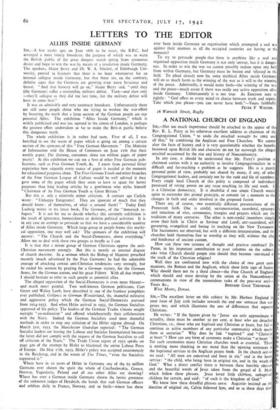A NATIONAL CHURCH OF ENGLAND
Snt,—Not too much importance should be attached to the appear of the Rev. K. L. Parry in his otherwise excellent address as chairman of the Congregational Union, " to undo the mischief wrought by 1662 and all that," by combining the Anglican and Free Churches. We cannot alter the facts of history and it is very questionable whether the benefits bestowed upon British life and character do not far outweigh the alleged mischief occasioned by the rise and history of Nonconformity.
In any case, it should be understood that Mr. Parry's position as chairman carries with it no authority to involve Congregationalists in so difficult and far-reaching a problem as he suggests. His is a purely personal point of view, probably not shared by many, if any, of other Congregational leaders, and certainly not by the rank and file of members Every single local Church of this polity is composed of individuals possessed of voting power on any issue touching its life and work. It is a Christian democracy. It is doubtful if one single Church would agree to surrender this primal principle, or consent for a moment to the changes in faith and order involved in the proposed fusion There are, of course, two essentially different presentations of the Protestant faith. One is credal, sacramentarian, sacerdotal, episcopal and tenacious of rites, ceremonies, liturgies and prayers which are the traditions of many centuries. The other is non-credal (members simply avow their faith in Christ as Saviour and Lord), ants-sacerdotal, self- governing, evangelical and basing its teaching on the New Testament The Sacraments are observed, but with a different interpretation, and the churches hold themselves free to worship as they will, without the clog and hindrance of ancient custom.
How can these two systems of thought and practice combine? Dr. Paton, in his important contribution to your columns on the subject asks what Church should people join should they become convinced of the truth of the Christian religion?
Well they are confronted now with the choice of two great com- munions, the Roman and the Anglican, which show little sign of fusion. Why should there not be a third choice—the Free Church of England, which should and must develop by the union of the Nonconformist communions in view of the tremendous tasks of the post-war era?—


























 Previous page
Previous page